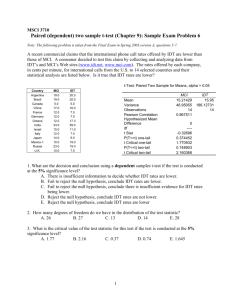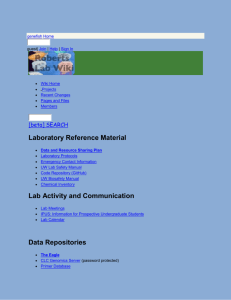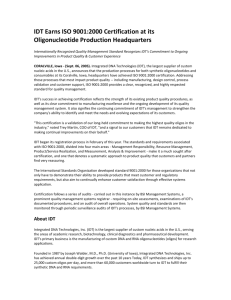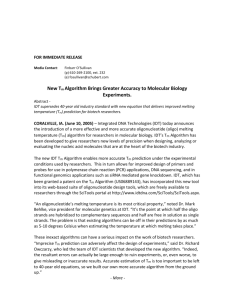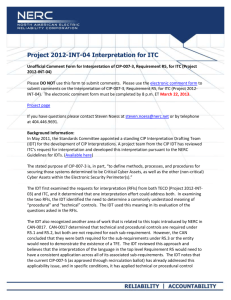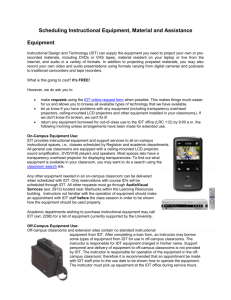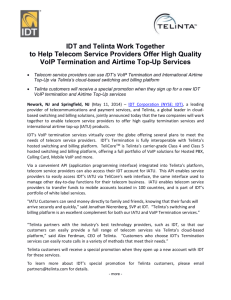Security Fencing Programme - Parliamentary Monitoring Group
advertisement
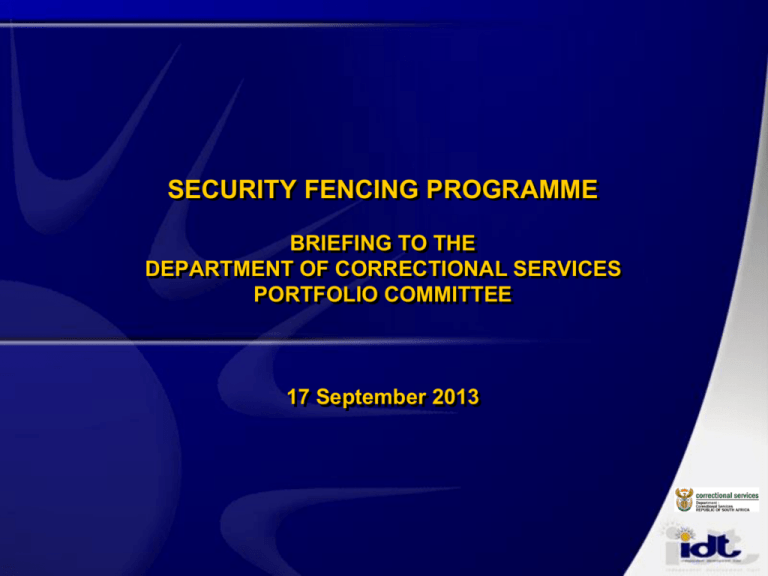
SECURITY FENCING PROGRAMME BRIEFING TO THE DEPARTMENT OF CORRECTIONAL SERVICES PORTFOLIO COMMITTEE 17 September 2013 PURPOSE At the request of the Parliamentary Portfolio Committee on Correctional Services, the Department of Correctional Services (DCS), in association with the Independent Development Trust (IDT), have prepared a presentation to address the concerns raised by the Committee: • The Role of the IDT • Management of the Programme • Programme Budgets THE IDT BACKGROUND The 1997 Cabinet mandate is still in place: “The IDT must be transformed into a government development agency that will implement projects which are commissioned by government departments.” Integrated into the public service delivery system in 1999 with the promulgation of the PFMA and listed as a Schedule 2 Major Public Entity. Achieved 10 successive years unqualified audit reports Reports to Parliament through the Minister of Public Works, the Shareholder Representative and Executive Authority. Thus the IDT seeks to contribute towards the mandate, vision and strategic objectives of Department of Public Works (DPW) Is a special purpose vehicle which has since 2000/01 directed over R14.5bn of government’s development investment. Supports all spheres of government with the delivery of its mandate through programme implementation agreements. Does not have a funded mandate. Charges a management fee in addition to recovering programme overhead costs. PROGRAMME EXPENDITURE PERFORMANCE TREND: 2009-10 TO 2012/13 6,000,000,000 5,647,569,270 2009/10 2010/11 5,000,000,000 4,700,380,000 2011/12 2012/13 4,292,853,000 4,066,322,000 4,000,000,000 4,137,434,000 3,536,538,000 3,131,226,000 3,000,000,000 2,689,023,000 2,251,223,000 2,238,712,000 2,000,000,000 1,802,934,000 1,635,645,000 1,206,753,000 1,000,000,000 588,500,000 449,143,000 0 Apr May Jun Jul Aug Sep Oct Nov Dec Jan Feb Mar TOTAL PROGRAMME DISTRIBUTION: 2012-2013 Programme Category Criminal Justice Systems Facilities Educational Facilities Enterprise Development Environmental Intervention Food Security Health Care & Facilities Other Poverty Relief & EPWP Public Facilities Sports, Arts and Culture Water & Sanitation Welfare Support and Facilities Grand Total Total % Contribution R 676 957 892 12.0% R 2 835 057 678 50.2% R 389 929 0.0% R 128 263 491 2.3% R 132 165 349 2.3% R 1 072 169 869 19.0% R 2 879 554 0.1% R 405 331 378 7.2% R 79 685 255 1.4% R 71 331 560 1.3% R 91 371 779 1.6% R 151 965 535 2.7% R 5 647 569 270 100.0% Please note that the Criminal Justice Systems Facilities expenditure value above is a combination between DCS and DoJ&CD All of the above departments have signed agreements governing their relationship with the IDT THE IDT AND DEPARTMENTAL FUNDS TRANSFER Please note that the above extracts are from a letter from National Treasury tin response to the IDT dated 12 May 2009 and signed off by the then Chief Director: Governance Monitoring and Compliance, Jayce Nair highlighting the various departments concerns around “advance payments” DEPARTMENTAL FUNDS TRANSFER TO IDT Please note that the above extracts are from a letter from National Treasury tin response to the IDT dated 12 May 2009 and signed off by the then Chief Director: Governance Monitoring and Compliance, Jayce Nair highlighting the various departments concerns around “advance payments” DCSSF02 PROGRAMME DCSSF02 IDT APPROACH TO DCS REQUIREMENTS • The DCS and the IDT entered into a Memorandum of Agreement in October 2011 whereby the IDT would serve as an implementation agent. • The Scope Statement compiled at the joint approach planning session between DCS and IDT is hereunder: • To reposition and transform the Department of Correctional Services in the Criminal Justice system through the implementation of quick and long term infrastructure delivery interventions. Ensure effective and efficient integrated service delivery informed by the White Paper on Correctional Services. • Approach adopted that 90% security is “no security at all”. • DCS required a comprehensive security solution. PORTFOLIO GOVERNANCE STRUCTURE MOA GOVERNANCE REQUIREMENTS MEETINGS: • • Site Meetings (SM) (Level 4): • Fortnightly • IDT Regional, DCS Local and Regional, Engineers, Contractor • Monitor site progress, challenges, compliance. Programme Progress Meeting (PPM) (Level 3): • Monthly • IDT National and DCS National, Engineers, Contractor • National progress, operational issues, Contractor requests and submissions MOA GOVERNANCE REQUIREMENTS MEETINGS: • • Programmes Steering Committee (PSC) (Level 2) • Monthly • IDT National, DCS National and invited Service Providers • Responsible for oversight of all DCS/IDT Projects Client Meeting (CM) (Level 1) • Monthly • IDT National, DCS National • Responsible for oversight of all DCS/IDT Projects PSC RESPONSIBILITIES • Oversight • Time • Cost (Scope Management) • Quality • Budgetary Control • Monthly meetings and co-ordination • Programme Delivery • Liaison with respect to local and regional issues • Ensure Compliance with the MOA SCOPE OF WORKS 1 of 2 (External) • High Security Fences • Sallyports and Guardhouses • Agricultural and Perimeter Fences • Earthworks and Civils • Fibre and Copper Network • Electrical Infrastructure • Closed Circuit Television • Generators • External Lighting along fences • Detection Systems • Gates SCOPE OF WORKS 2 of 2 (Internal) • Access Control Points: • Software systems: • X-Ray machines • Metal detectors • Biometric readers • Turnstiles • Closed Circuit Television • Workstations • Cabling and Wi-Fi network • Intercoms • Cell Phone Detection • Uninterrupted Power Supplies • Prison Doors • • Integrated Security Management System • Prison management System • Graphic User Interfaces General: TENDER PROCESS-PSP AND CONTRACTOR • Open Tender process undertaken to procure a Professional Service Provider and Contractor. • The Professional Consultant and Contractor were appointed by February 2012 for the “Installation of high security of 27 Prisons (Correctional Centres) on 13 Facilities as well as associated integrated security systems and sallyports that go with the fencing” for a tender value of R476m. PROJECT EXECUTION PLAN • Contractor was advised to begin procurement immediately to accelerate delivery. • This instruction was imperative due to the fact that the grade of steel used for the fencing needed to be fabricated by the local steel foundries. • The fence manufacturer also had to switch over their factory to manufacture the customised fencing for DCSSF02. • At the beginning of the programme, an assessment was conducted to confirm the scope of works meets the operational requirements. This process is called the Project Execution Plan (PrEP). This led to a mitigation of scope variance at a very early stage. • PrEP reports were produced which considered the operational needs of each facility. This had resulted in quantity fluctuations as opposed to rate fluctuations. Only the original tendered rates were used. PROJECT EXECUTION PLAN IMPLEMENTATION PrEP Results • 15 Correctional Centres on 8 Facilities within the Tender amount. Region Management Area Facility/Correctional Centre Gauteng Johannesburg JHB Med A, Med B, Female, Juvenile Kgosi Mampuru II Pretoria Local Durban Umzinto Pietermaritzburg Pietermaritzburg Free State Kroonstad Harrismith Eastern Cape Mthatha Mthatha Western Cape Goodwood Goodwood Pollsmoor Pollsmoor Max, Med A,B,C, Female KZN IMPLEMENTATION PreP Results cont. • Balance of 12 Correctional Centres on 5 Facilities : Access on hold until further funds allocation from DCS. Region Management Area Facility/Correctional Centres Gauteng Modderbee Modderbee Free State Kroonstad Kroonstad Med A,B, Female, Juvenile Eastern Cape St Albans St Albans Mpumalunga Barberton Barberton KZN Durban Westville Med A,B,C, Female, Juvenile PROGRESS AS AT 15 JULY 2013 Preliminary & General (P&G’s) are defined as those expenses which include overhead costs and site establishment. A “bond store” system was implemented where material was procured and stored at a central warehouse for distribution to various sites. BOND STORE The bond store principle was initiated at the beginning of the DCSSF02 contract due to the large amounts of fencing material that needed to be manufactured and stored on location at the fence manufacturers on site warehouse. Due to the need to finalise the PrEP process which led to a variance in final quantities this storage method was used as an interim point of transfer. Cognisance must be taken of the fact that the fencing panels range between 6-8 metres in length and have a standard width of 3 metres, hence this led to the panels being transferred across the country by road from the Cape using abnormal vehicles. The bond store has ceased to exist in the course of 2012 as the final quantities had been agreed by the PrEP process and dispatched from the suppliers “bond store” in the Cape directly to the respective fencing sites nationally. PROJECTED COMPLETION DATES PROGRESS PHOTOS Pietermaritzburg Pietermaritzburg Umzinto Harrismith Harrismith PROGRESS PHOTOS Pretoria Goodwood Mthatha Pollsmoor Johannesburg PROGRAMMES CHALLENGES • Excessive Rainfall hampered the implementation process • Existing services, no records exist • Poor soil conditions hamper progress on most of the sites • Inconvenience caused due to the new security measures e.g. parking for staff affected • Construction in a “live” facility, requires that the facility is fully secure at all times. Thank You
